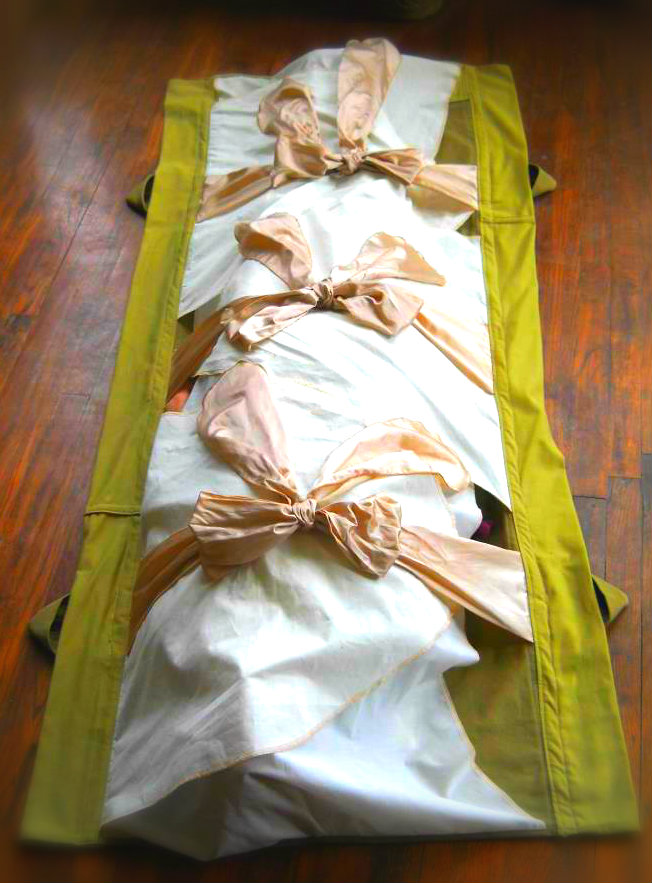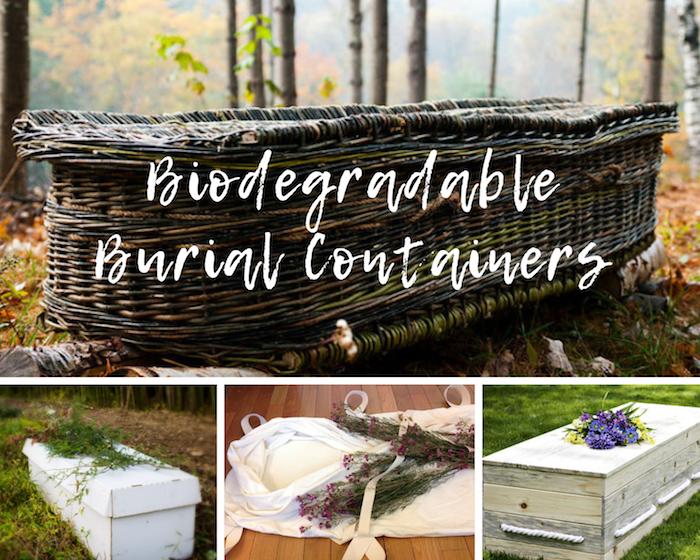Biodegradable Burial Containers for Green Burial: Part 1 – The What & Why + Shrouds
What do you want to happen to your body after you die? I’ve often fantasized about a Viking Funeral, imagining my body drifting away in a wooden boat as flaming arrows shower down and it all goes up in flames. As epic as this sounds, it is not an option seeing as it is illegal and not even real (I know… it broke my heart too). Luckily, there are a bunch of other great options for the interment of the human body. In this blog series, we focus on biodegradable burial containers for green burial. This first blog covers the ‘What’ and ‘Why’ and highlights the first of many biodegradable burial containers we will feature in this series.
What Is a Biodegradable Burial Container?
A biodegradable burial container, simply put, is a container you place the body into for burial that will decompose naturally and become part of the earth. To be certified by the Green Burial Council (which Carolina Memorial Sanctuary is), there are burial practice criteria which include: no embalming fluid, no use of a vault (a vault lid, concrete box, slab or partitioned liner in the burial plot), and “Limit burial containers, shrouds, and all associated materials to those made from biodegradable, natural materials.” In order to qualify as “green” the burial container needs to be made from natural materials, free from toxic chemicals, and capable of being broken down by bacteria and other living organisms.
Why Choose A Biodegradable Burial Container?
Natural burial containers are simple, affordable, and much better for the environment than conventional caskets. They are made from sustainable and renewable materials and have a lighter carbon footprint compared to most caskets you would buy at a funeral home. Conventional caskets usually contain metal (some are completely made of metal), which are a particular concern for acidic soil and can leach heavy metals such as zinc, lead, copper, and iron. Many conventional wooden caskets use treatments (stains, varnishes, etc.) that contain harmful chemicals that can also leach into the soil. [Note: Things that leach into the soil have the potential of contaminating water sources. See the report linked at the end of this paragraph for more info.] And the amount of natural resources that are being used is tremendous. The Green Burial Council reports:
Current estimates (Woodsen, 2014) regarding permanent installation of cemetery goods in the ground in US cemeteries each year are: 20 million board feet of wood (77,000 trees), 4.3 million gallons of embalming fluids, 1.6 million tons of reinforced concrete, 17,000 tons of copper and bronze and 64,500 tons of steel.
In addition to being better for the environment, the cost of green burial containers is a fraction of the cost of conventional caskets (average cost of $275 – $3000 compared to $2000 – $20,000).
And if you’re planning a Jewish burial, green burial containers meet the requirements of being simple, natural, and free of metal.
Biodegradable Burial Container Options
There are a number of options for biodegradable burial containers which include simple shrouds, a variety of casket and coffin options, and some more unique/unconventional options as well. We’ll talk about Burial Shrouds in this blog, Part 1. We’ll cover coffins and caskets in Part 2. And last, we’ll discuss some of the more unusual options in Part 3. [You can learn about green options for cremated remains here.]
Burial Shroud

Simply put, a burial shroud is a piece of fabric you wrap (or shroud) around the body. It’s as simple as simple gets. Burial shrouds are designed for the body to be placed within them, so are long and rectangular (like a blanket), fold around the body, and have ties (either sewn onto the shroud or separate) that tie the shroud into place once it’s wrapped around the body. Don’t confuse a custom made burial shroud with just any piece of fabric. They are made out of materials that are able to hold the weight of a body and are designed and crafted to make shrouding simple. Once a body is wrapped and tied in a burial shroud, it can either be placed directly into the ground (at least at a green cemetery) or be placed within a casket.
Burial Shroud Options
Burial shrouds come in a variety of fabrics and colors. Common materials include linen and cotton; less common are silk and wool. Ideally, you want to choose materials that are biodegradable, such as those mentioned above, and avoid synthetic fibers. Custom made shrouds are a great resource but you also have the option of creating your own shroud using materials that hold significance such as a special blanket or piece of clothing from a loved one. A beautiful custom is to tuck fresh cut flowers into the ties once the deceased has been shrouded.
Burial Shroud Cost
$289 – $899
Where To Buy Burial Shrouds
- Local Option: We believe in buying local and so we carry a supply from Shrouded House, made by Christi Whiteley, a former fashion designer and Asheville resident. Contact us to purchase one of these shrouds (cost: $300).
- Natural Burial Company Store
- Vale Shrouds
- Last Dance Shrouds
- Kinkaraco
Green Tip: To reduce carbon footprint, check the source of the material and opt for something local when available.
Originally published 2.21.17. Updated 7.22.19
Part 2 in the series covers different biodegradable caskets and coffins for natural burial, and Part 3 talks about some of the more strange and unusual options. Join our newsletter and follow us on Facebook so you know when our next blog is published. If you are interested in learning more about green burial or scheduling a guided tour of Carolina Memorial Sanctuary, please feel free to contact us. We love exploring the possibilities and sharing what we know.

